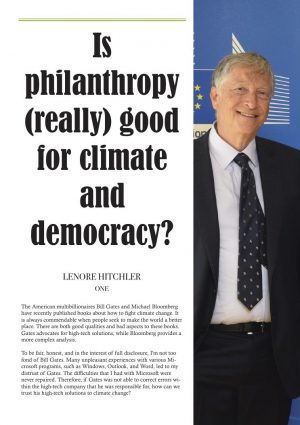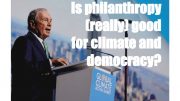 The American multibillionaires Bill Gates and Michael Bloomberg have recently published books about how to fight climate change. It is always commendable when people seek to make the world a better place. There are both good qualities and bad aspects to these books. Gates advocates for high-tech solutions, while Bloomberg provides a more complex analysis.
The American multibillionaires Bill Gates and Michael Bloomberg have recently published books about how to fight climate change. It is always commendable when people seek to make the world a better place. There are both good qualities and bad aspects to these books. Gates advocates for high-tech solutions, while Bloomberg provides a more complex analysis.
To be fair, honest, and in the interest of full disclosure, I’m not too fond of Bill Gates. Many unpleasant experiences with various Microsoft programs, such as Windows, Outlook, and Word, led to my distrust of Gates. The difficulties that I had with Microsoft were never repaired. Therefore, if Gates was not able to correct errors within the high-tech company that he was responsible for, how can we trust his high-tech solutions to climate change?
Besides my lack of confidence in Gates’ technological capability, I do not have faith in his ethical standards. His personal improprieties and scandals have recently been made public. In 2000, a district court judge ruled that Microsoft violated multiple sections of the Sherman Antitrust Act. In the same year, the Bill and Melinda Gates Foundation was formed. I find it quite coincidental and convenient that right after losing his court case, he launched his philanthropical career.
Additionally, it is reasonable to expect multibillionaires to pay their fair share of taxes. Michael Edwards, who has worked for the Ford Foundation, explained the negative consequences of not paying one’s share of taxes. He stated, “Philanthropy of all kinds saves you money on your tax bill but reduces the resources that governments have to pursue the public interest (to the tune of $40 billion in the U.S. in 2006 alone).”
In addition to breaches of legal and ethical norms, Bill Gates has excessive power in fields in which he has no qualifications. Through his influence and financial contributions, he is a strong power in the movement for replacing public schools with private education. Instead of working to improve water and air supplies and promoting healthy immune systems, he merely provides vaccines.
His most recent cause is to promote fertilizers, pesticides, irrigation, the monopolization of seed crops, and monoculture in Africa as opposed to a more ecological agricultural system. He dropped out of college and never graduated. Therefore, he does not have the proper credentials to decide medical, educational, energy, and agricultural policy. However, the media treats him as a scientific expert, and governments throughout the globe are allowing him to make decisions that affect their countries. Despite never being elected to any position of power, he has great global power. However, it is reasonable to assert that citizens, through their elected officials, should make the decisions that affect their environment and lives.
There are also some discrepancies between the Gates foundations’ goals and their investments. Sociologist Linsey McGoey wrote a book about the Gates foundation. She stated that “Investigative reporters from the L.A. Times were the first to report widespread dissatisfaction with the Gates Foundation’s endowment investments in companies, such as Exxon Mobil, pointing out that flares from oil plants mushrooming across the Niger Delta [located in Nigeria, Africa] are widely believed to have caused epidemics of bronchitis in adults and lowered immunity in children – increasing their susceptibility to measles and polio. Local physicians told the L.A. Times that they felt that unregulated oil extraction was a prime cause of the poor health they faced daily.”
This is ironic as Gates spent money to prevent polio and other diseases in Africa while at the same time investing in a company that harms health. Exxon Mobil is a major petroleum producer that contributes to the greenhouse effect, which in turn causes climate change.
Another example of Gates’ conflict of interests concerning climate change is his relationship with Coca-Cola. According to McGoey, “Through its shares in Berkshire Hathaway, the Gates Foundation is heavily invested in Coca-Cola.”
As shown by a Wall Street Journal news report, he also personally invested in the company that Bill Gates transferred about $121 million worth of stock in Coca-Cola to Melinda Gates, his ex-wife. Nicoletta Dentico, director of the global health program of the Society for International Development, reported that the Gates Foundation Trust’s investments include $466 million in Coca-Cola factories operating south of the U.S.
Coca-Cola is a heavy contributor to climate change. An article in the Wall Street Journal reported that the production of one liter [33.81 ounces] of Coca-Cola sold at the supermarket produces 346 grams [12.20 ounces] of the greenhouse gas carbon dioxide. Statista is a company specializing in market and consumer data, and it reported some alarming facts regarding Coca-Cola and climate change.
In 2020, Coca-Cola’s global manufacturing sites produced approximately 5.24 million metric tons of greenhouse gas emissions. Petroleum is used in plastic production, and Coca-Cola produces around three million metric tons worldwide of plastic packaging per year. The disposal of plastic containers produces even more greenhouse gases. For example, annual emissions from mismanaged plastic waste produced in just six countries were estimated to be 2.5 million metric tons.
Besides Coca-Cola, the Gates Foundation has associated with organizations whose actions lead to climate change. The Gates Foundation joined the Rockefeller Foundation to initiate the Alliance for a Green Revolution in Africa (AGRA). AGRA promotes agricultural practices such as irrigation, fertilizer, and pesticides that use a lot of fossil fuels for ingredients, manufacturing, application, and transportation. AGRA policies also lead to monoculture.
However, adapting to climate change requires biodiversity. The practices of Monsanto, which is a major producer of seeds for the green revolution, contribute to a more monocultural form of agriculture. In 2010, the Gates Foundation bought $23 million worth of Monsanto’s shares. In other words, biodiversity is needed to fight climate change, and the Gates Foundation has invested in businesses that lead to biodiversity loss.
Even though Gates had invested in companies that contribute to the greenhouse effect, he eventually became interested in climate change. He published How to Avoid a Climate Disaster—The Solutions We Have and the Breakthroughs We Need. The good news is that Gates recognized that climate change is a real phenomenon and that steps must be taken quickly to reverse it. It is admirable that he took a lot of time to educate himself by reading books and scientific reports and discussing the subject with experts.
He did a good job of educating his readers about various aspects of climate change. For example, he did an excellent job correlating slight temperature changes with massive environmental changes. He stated, “During the last ice age, the average temperature was just 6 degrees Celsius lower than it is today. During the age of the dinosaurs, when the average temperature was perhaps 4 degrees Celsius higher than today, there were crocodiles living above the Arctic Circle.”
In other words, only ten degrees Celsius mark the difference between an ice age and a vast increase in tropical weather.
Gates also did a tremendous job of discussing some of the causes of climate change, including manufacturing such products as cement, steel, and plastic, the generation of electricity, heating and cooling buildings, and the agricultural and transportation systems.
Unfortunately, the bad news is that Gates omitted many other causes of climate change. For example, preparing for and engaging in warfare uses a tremendous amount of fossil fuels. Planned obsolescence, in which goods are deliberately designed to have short lifespans, also wastes energy. Printed advertisements, the fashion industry, pet care, and lawns use large amounts of fossil fuels.
Not only did Gates neglect deforestation, one of the main contributors to climate change, but he failed to mention that he has invested in biofuels. Growing the crops to produce biofuels has caused worldwide global rainforest deforestation.
Gates also neglected alternatives such as public transportation and various agricultural alternatives such as agroecology, regenerative and sustainable farming, forest farming and permaculture, and local food production, including gardens and innovations such as vertical farming.
Also, Gates excluded many accessible, relatively low-cost technologies. For example, he noted that women and girls in Africa spend hours collecting firewood for cooking. Gates also observed children doing their homework by candlelight. He did not mention solar ovens and solar lights, which are low-tech alternatives.
Just as Gates published a book about fighting climate change, multibillionaire Michael Bloomberg co-authored Climate of Hope—How Cities, Businesses, and Citizens Can Save the Planet with Carl Pope. Most chapters were individually written by Bloomberg or Pope except for the few chapters they wrote together.
Bloomberg and Pope wrote in the preface that climate change advocates need more effective ways to motivate new people. The following rather long passage is nevertheless worth reading. “Telling people that they might possibly save the Earth from distant and uncertain harm is not a great way to convince them to support a particular policy. But what happens when you tell people that they can definitely, right now, reduce the number of asthma attacks suffered by children, save their own families and friends from respiratory disease, extend their own life expectancy, cut their own energy bills, make it easier for them to get around town, improve their quality of life, increase the number of jobs in their community, and strengthen our national energy security—all while increasing the long-term stability of the global climate?”
Bloomberg also discussed the positive lifestyle factors in cities that account for the lower carbon footprints of city residents than suburban and rural residents. He stated, “Because most urban residents live in apartments that are smaller than the average American home and require far less energy to heat in winter and cool in summer. City residents also tend to drive less because they can walk, bike, or take mass transit to get to work and get around. As a result, the average per capita carbon footprint in New York City is two-thirds smaller than the national average.”
Thus, living in cities produces fewer greenhouse gases per person that cause global warming. This is important because rising temperatures damage the health of people.
Gates did not seem interested in climate change’s global public health consequences. His health programs focus on privatized individual solutions to specific diseases. Thus, Gates concentrates on producing vaccines instead of broad-based public health measures to improve health in general.
In contrast, Bloomberg recognizes that public health issues are increased because of climate change and acknowledges that governments must be involved instead of relying solely on individual philanthropy. Bloomberg wrote: “One of the biggest changes in urban governance in this century has been mayors’ recognition that promoting private investment requires protecting public health—and protecting public health requires fighting climate change. Why? Because the largest sources of air pollution that threaten public health are also the biggest sources of greenhouse gases that are warming our planet. The former president of the World Medical Association, Dana Hanson, called climate change a ‘massive threat to global health that will likely eclipse the major known pandemics as the leading cause of death and disease in the twenty-first century.'”
Bloomberg was particularly critical of the health damages from burning coal. For example, he reported that statistics from 2011 showed that the annual cost of health was over $100 billion. He also noted that the EPA estimated that more than 23,000 miles of rivers and streams had been polluted from liquefied coal ash, and half the toxic chemicals polluting American streams and rivers originated in coal ash pools.
Just as using coal has detrimental effects on health and increases pollution, biomass cooking fuels in the third world also damage health and increase pollution.
According to Bloomberg’s co-author, “The soot produced by biomass cooking is estimated to kill 4 million people every year—more than malaria or tuberculosis. […] Preparing food—is estimated by the World Health Organization to be the fourth largest risk factor for disease in the developing world. […] Primitive cooking generates about 25 percent of the world’s black carbon, so it’s about 4 percent of the total climate problem. Women without access to modern fuels spend one to five hours a day gathering fuel.”
Unfortunately, neither Bloomberg nor Gates advocated for solar ovens, which are relatively cheap, easy to produce, and do not burn fossil fuels. Another major worldwide public health problem caused by climate change is the increased number of heatwaves. Bloomberg provided alarming information about this when he stated that: “Heat waves are the deadliest kind of natural disaster in the United States, killing more people each year on average than hurricanes, lightning, tornadoes, earthquakes, and floods combined.”
Thus, both Bloomberg and Gates were very aware of the problem of climate change. However, there were problems regarding both authors’ solutions. For example, Gates wrote about putting several hundred million dollars into starting a company to design a next-generation nuclear power plant.
Even though he acknowledged problems with reactor accidents and that nuclear waste is dangerous and hard to store, he still supports nuclear power. Bloomberg stated that he did not want to ban fracking or stop the Keystone pipeline and that he supports nuclear power. Most environmentalists do not support fracking, pipelines, and nuclear power. Thus, some of Bill Gates and Michael Bloomberg’s solutions are better than others.
Nevertheless, both men have contributed to the ongoing dialogue on climate change. However, Gates relied on high-tech solutions, which use a lot of energy. Bloomberg presented an effective way of reaching potential proponents as well as showing that people need to work together to solve the problems caused by climate change.
Lenore Hitchler



